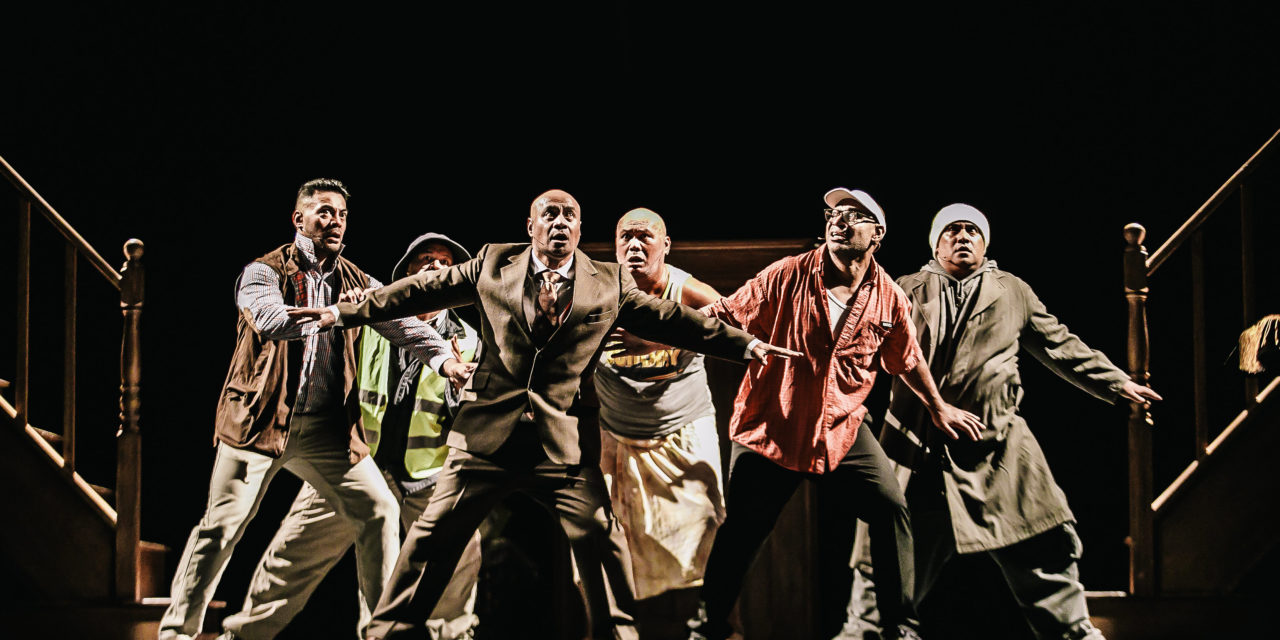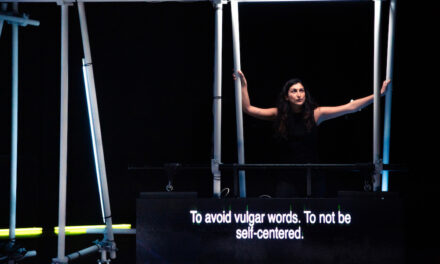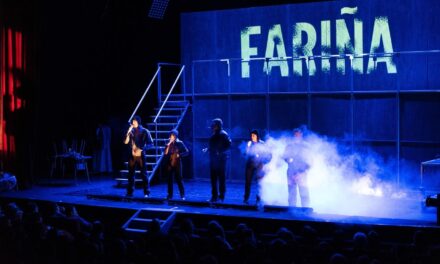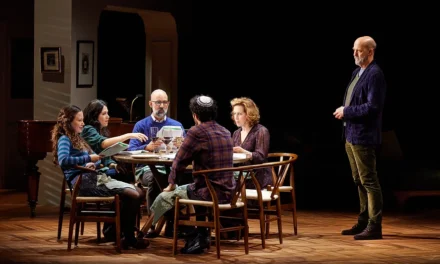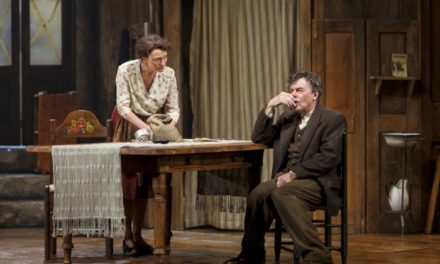The Naked Samoans Do Magic
Commissioned by the Auckland Arts Festival and co-produced with The Conch. Directed by Nina Nawalowalo and Tom McCrory.
The Naked Samoans Do Magic is a unique collaboration between two iconic yet highly contrasting Pasifika theatre companies. The Naked Samoans formed in 1998 and after a string of highly popular sketch-comedy stage shows, their animated series Bro’Town (2003-6) became New Zealand’s most successful television comedy. The Conch launched in 2002 with the critically acclaimed Vula, a stunningly beautiful devised piece that established Artistic Director Nina Nawalwalo’s expertise in composing elegant stage imagery based in her Fijian heritage and her relationships with other Pacific Island cultures. In The Conch’s productions, Nawalowalo’s training in magic, mime, mask, puppetry, and physical theatre combines with Pacific imagery and artforms to create a highly original aesthetic. Her expertise as a magician is the creative spark that ignited the concept of this new work, in which six members of the Naked Samoans re-unite after a long absence from the stage for a highly entertaining comedy-magic show.
The celebratory mood of The Naked Samoans Do Magic is a stark contrast to The Conch’s recent acclaimed production The White Guitar, which dealt with the struggles of a Samoan migrant family. The White Guitar looked at the dark side of racism in New Zealand and its negative impact on the assimilation of Samoan migrants into Palagi (white) society. The same theme has often been explored in previous shows by the Naked Samoans. Their “nakedness” was not literal (except in publicity shots), rather it was indicative of a rawness and honesty in their blisteringly dark comedy, which featured controversial topics such as racism, child abuse, and youth suicide. Naked Samoan Oscar Kightley worked with The Conch as script advisor for The White Guitar, and as Nawalowalo and co-director Tom McCrory comment in their program note, this successful collaboration led to “a strong pull to go further.”
The result is a lighter work than the previous productions of either company, attracting many family groups to the matinee performance I attended. The performance venue, the historic Civic Theatre in central Auckland, perfectly matches the magical subject matter. The Civic, built in 1929 and seating over 2,000 people, is an art deco architectural marvel, an Orientalist fantasy. The dimly lit foyers with their ornate “Arabian Nights” aesthetic and an exotic “Elephant Bar” lead to a sumptuous auditorium with soaring, filigreed Moorish columns, archways, balconies, and turrets. As we settle into our plush red seats, the lights dim to reveal a “night sky” of twinkling stars overhead. The occasional comet flashes past. Before the red velvet curtain rises, we’re already in a world of nostalgic fantasy and illusion.
The first joke in the play is that the members of the Naked Samoans–in reality among New Zealand’s most successful actors, scriptwriters, and filmmakers–are all failed comedians. This fictional scenario conveyed through a wonderfully parodic faux-retro film footage narrated by illustrious broadcaster John Campbell, tells us that their show business careers dive-bombed after their first show received terrible reviews. In this fictional scenario, Oscar Kightley has become a middle manager in the Ministry of Pacific Island Affairs and Robbie Magasiva a prosperous salesman in Queenstown who is “turning into a Palagi.” Shimpal Lelisi scrubs windscreens in Bunnings’ carpark, Iaheto Ah Hi is homeless and David Fane has become mute requiring him to communicate by ringing a bell, dependent on his caregiver Mario Gaoa. These nods to current social issues promise the full-on scathing black comedy of the Nakeds’ previous shows, but what we get is a more gentle style of humor.
Summoned to a lawyer’s office, a woman emerges magically from a briefcase to reveal that the group has been bequeathed a large gothic mansion in Ponsonby by a recently deceased Samoan magician “Sionedini.” Arriving at the address, the men find themselves in a haunted house fantasy mixed with slapstick comedy, as Nawalowalo introduces her signature illusionistic tricks. Gigantic playing cards flash across the stage, characters appear and disappear behind them. Doors creak open then mysteriously lock to separate the men from one another. A conjurer’s rabbit plays games of hide and seek, then tosses a white cloth in the air and vanishes before our very eyes. The men’s clothing changes as if they have gone back in time. A ghostly image of Sionedini presides over all of this, mixing the conventions of the horror film with magical Pacific imagery. A red hibiscus floats in mid-air, tapa cloth panels float around a beautiful traditional dancer. This seems to have a healing effect, as the mute Dave recovers his voice, and his bell is spirited away by the rabbit. The men begin to be infected by the spirit of magic. Dave flies around the stage on a magic carpet and there’s something empowering in his amazement as he declares, “I flew, I learned to fly.”
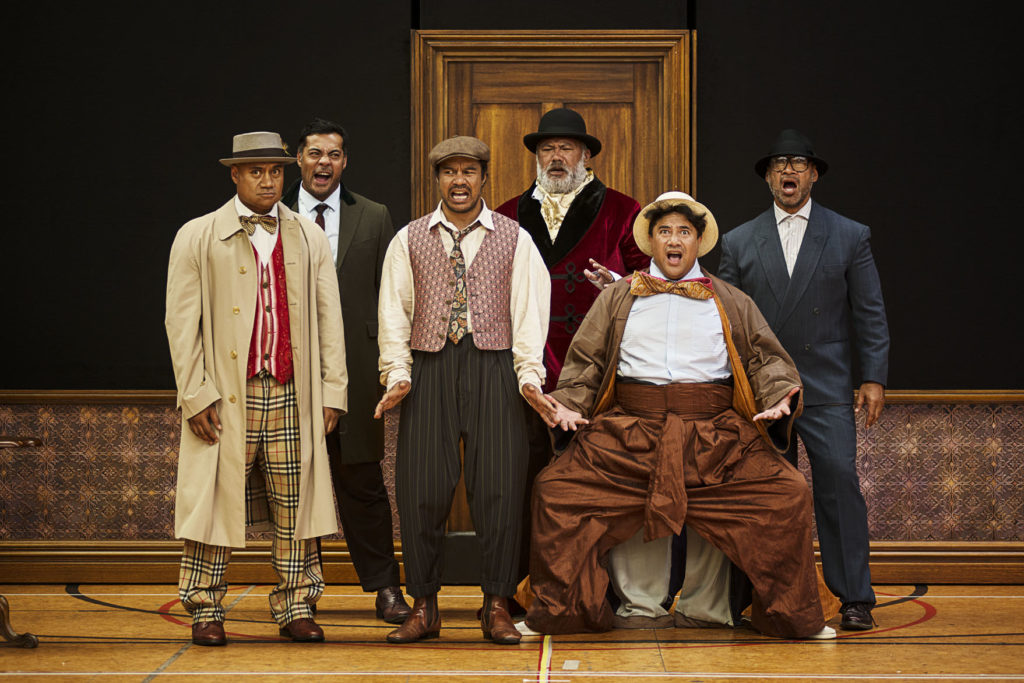
Oscar Kightley, Robbie Magasiva, Shimpal Lelisi, David Fane, Iaheto Ah Hi, and Mario Gaoa in The Naked Samoans Do Magic. Directed by Nina Nawalowalo and Tom McCrory. Photo credit Raymond Sagapolutele. Auckland Arts Festival 2018.
The previous Naked Samoans shows I’ve seen have been bare-stage, zero-tech events, their impact depending on audience rapport and skilled comic acting. In contrast, this show is spectacularly designed and choreographed. Penny Fitt’s adaptive set constantly transforms into different spaces, with staircases, doors, corridors, etc… rolling on and off at speed. Lisa Maule’s atmospheric lighting interacts with various gauzes to create shadow play and ghostly effects. Music selected by Tom McCrory and sound design by Chris Winter brings together the pizzazz of classic magic soundtracks with Pacific flavors, creating a wonderfully nostalgic atmosphere as that perfectly complements the Marx Brothers-style routines.
There are flashes of the Nakeds’ trademark acerbic transcultural satire. When Shimpal punches Robbie, Oscar comments ironically “abuse is a real issue in our community mate.” In response to a patronizing comment about Pacific Islanders, Oscar dryly responds that “a fifth of the world’s languages is from the Pacific.” As the men fear for their lives in the haunted house, they recall that in horror films “it’s always the black guy that dies first,” causing them to compare their skin color–“I’m more café au lait,” says one hopefully.
As the illusions multiply, Oscar laments “we gave up on our dreams, there’s no magical solution,” but as if to prove him wrong, the curtain descends, and is raised again to reveal a full-on magic show with the Nakeds in top hats, tuxedos, scarves, cloaks, and canes, and with all of the familiar devices of the magic spectacle. They tap dance as if in the chorus of a 1930s musical. A red handkerchief transforms into a walking stick. A woman picked from the audience is sawn in half. A bullet is caught between the teeth. Part of the delight of the show is seeing these well-known performers relishing their recently-acquired magician skills with a kind of child-like innocence.
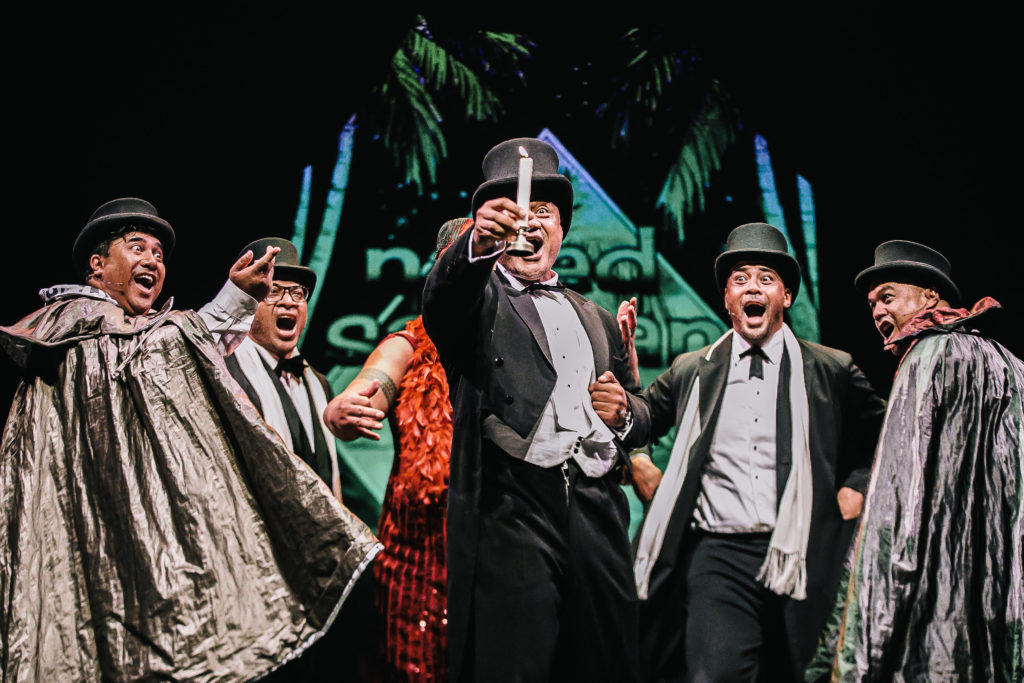
The Naked Samoans perform their magic routines in The Naked Samoans Do Magic. Directed by Nina Nawalowalo and Tom McCrory. Photo credit Andi Crown. Auckland Arts Festival 2018.
Like The Conch’s previous work, The Naked Samoans Do Magic brings together contrasting performance traditions to create a genre-bending sense of something fresh and new. As the show reaches its climax, a procession of teenage girls in school uniform emerge from a large cabinet upstage centre. Finally, the cabinet falls apart to reveal the remainder of the cast and crew, which includes young women and children. In a show featuring almost exclusively middle-aged men, this is both a surprise and an intriguing alienation effect. Does it suggest that these veteran performers are opening the way for a new generation of young Pacific performers? This would certainly fit with the philosophy of The Conch, who have for many years run a youth theatre program called Conchus, designed to build the emerging practitioners of tomorrow. In their program note, Nawalowalo and McCrory write,
“Magic is all about the rediscovery of a childlike wonder at the world and laughter the liberation from fear. And at a time of fear when the wonder of the world has drained from so many eyes, laughter and magic are more important than ever. From wonder comes hope, from laughter in the face of fear comes the courage to act.”
While hinting at many of the social problems that affect Aotearoa and the world, the production celebrates the transformative power of magic and of theatre, leading to a sense of optimism and hope. The show uses magic in the same way as music was used in The White Guitar as a form of redemption and reconciliation. So in the end, The Naked Samoans Do Magic is far more than an entertaining show to keep us amused on a Saturday afternoon. In contrast to the hocus pocus and panache of the old-school magic routines, the show ends to the laid-back reggae beat of Fat Freddy’s Drop singing “Hope for a generation, just beyond my reach not beyond my sight.” The show seems to ask, are magical solutions possible in the real world? The final revelations of The Naked Samoans Do Magic under the glittering night sky of The Civic can be seen as a call to action, a challenge to create a more hopeful future for the younger generation.
This post was written by the author in their personal capacity.The opinions expressed in this article are the author’s own and do not reflect the view of The Theatre Times, their staff or collaborators.
This post was written by David O'Donnell.
The views expressed here belong to the author and do not necessarily reflect our views and opinions.

